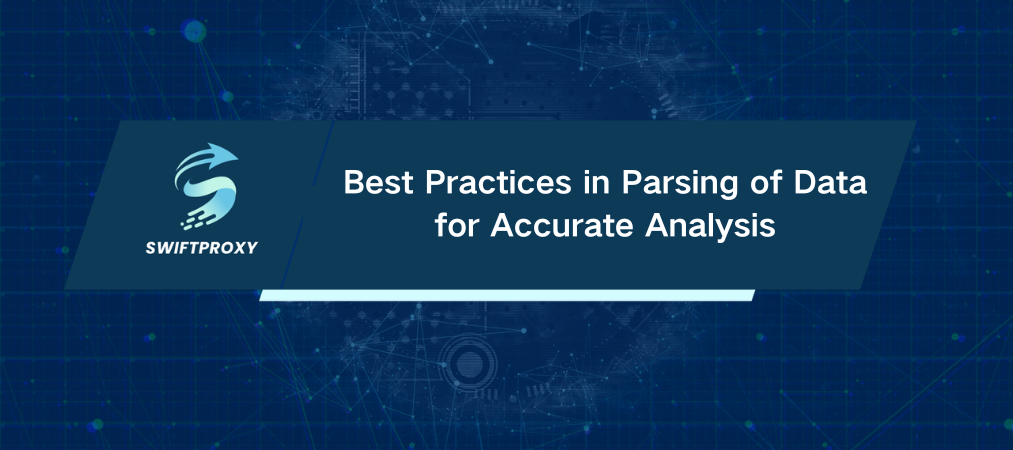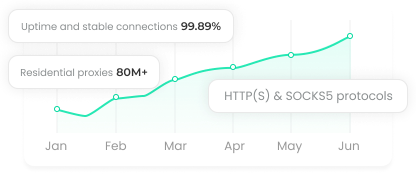Best Practices in Parsing of Data for Accurate Analysis

Imagine sifting through thousands of data points every day—websites, APIs, databases—all dumping raw, messy info. Trying to make sense of it manually? Impossible. Yet, decisions depend on this data. Parsing is your secret weapon. It turns chaos into clarity.
Parsing is the process of extracting meaningful information from unstructured or semi-structured data. Instead of wrestling with cluttered HTML, scattered files, or endless streams of raw text, parsing organizes the data into a format that's clean, structured, and ready for action.
Why does this matter? Because the quality of your data shapes the quality of your decisions. Whether you're tracking competitors' prices, feeding a machine learning model, or automating daily updates—parsing is the gatekeeper.
What Exactly Does a Parser Do
Here's the breakdown:
Set Your Target
You define exactly what you want. URLs, APIs, files, or specific elements like prices, headlines, or product descriptions.
Dive In & Analyze
The parser visits these sources, understands their structure—HTML, JavaScript, or API responses—and locates the data nuggets you need.
Filter & Clean
It tosses junk—ads, duplicate content, white space—and extracts just the essentials.
Convert & Organize
The raw data is transformed into clean, usable formats like CSV, JSON, or Excel.
Deliver or Integrate
Results come back to you or feed directly into your BI tools, CRMs, or dashboards.
Parsing in Action
Let's grab currency exchange rates directly from the European Central Bank. No fluff, just code:
import requests
from bs4 import BeautifulSoup
url = "https://www.ecb.europa.eu/stats/eurofxref/eurofxref-daily.xml"
response = requests.get(url)
soup = BeautifulSoup(response.content, "xml")
currencies = soup.find_all("Cube", currency=True)
for currency in currencies:
print(f"{currency['currency']}: {currency['rate']} EUR")
This script fetches an XML file with up-to-date exchange rates and extracts the currency codes and their values against the euro. Easy to plug into your finance or trading systems.
How APIs Speed Up Parsing
Parsing HTML can be tricky—websites change, structures break, anti-bot defenses kick in. APIs solve many of these headaches by offering clean, ready-to-use data formats like JSON or XML.
No guessing about HTML tags
Faster processing
Reduced risk of getting blocked
Easy integration with business systems
APIs come in flavors:
Open: Free, no keys needed (e.g., weather data)
Private: Requires keys and authorization (Google Maps, Twitter)
Paid: Subscription-based, often with request limits (SerpApi)
For example, NewsAPI collects news articles from diverse sources and presents them in neat JSON. This removes the pain of scraping hundreds of websites individually.
Sample code snippet for NewsAPI:
import requests
api_key = "YOUR_API_KEY"
url = "https://newsapi.org/v2/everything"
params = {
"q": "technology",
"language": "en",
"sortBy": "publishedAt",
"apiKey": api_key
}
response = requests.get(url, params=params)
data = response.json()
for article in data["articles"]:
print(f"{article['title']} - {article['source']['name']}")
Specialized Parsers
Not all data is straightforward. Some sites load content dynamically with JavaScript. Others shield data behind CAPTCHA or IP blocks. Complex tables, nested JSON, or multimedia files need more than basic parsing.
Specialized parsers handle:
JavaScript-rendered content
Bypassing protections with proxies and session simulation
Extracting from PDFs, images (OCR), or nested structures
These tools are indispensable for industries with unique data sources, like e-commerce giants or news aggregators.
Custom Parsers
When your data needs don't fit existing tools, build your own.
Custom parsers let you:
Target very specific data points (e.g., competitor prices)
Automate continuous updates without manual intervention
Seamlessly integrate with your CRM, ERP, or BI systems
Handle API-based extraction reliably, including retries on failures
Yes, it's more work upfront, but the payoff? Maximum efficiency and accuracy.
Conclusion
Parsing transforms raw, overwhelming data into your business's competitive edge. It powers smarter marketing, sharper financial insights, and faster decision-making. It eliminates manual drudgery, saving time and reducing errors.
In a world powered by data, businesses that excel at parsing gain a competitive edge. Sticking to manual data collection or outdated scraping methods means missing out on valuable insights. It's time to take parsing seriously—automate it, streamline it, and make it part of your core workflow.
Note sur l'auteur

Imagine sifting through thousands of data points every day—websites, APIs, databases—all dumping raw, messy info. Trying to make sense of it manually? Impossible. Yet, decisions depend on this data. Parsing is your secret weapon. It turns chaos into clarity.
Parsing is the process of extracting meaningful information from unstructured or semi-structured data. Instead of wrestling with cluttered HTML, scattered files, or endless streams of raw text, parsing organizes the data into a format that's clean, structured, and ready for action.
Why does this matter? Because the quality of your data shapes the quality of your decisions. Whether you're tracking competitors' prices, feeding a machine learning model, or automating daily updates—parsing is the gatekeeper.
What Exactly Does a Parser Do
Here's the breakdown:
Set Your Target
You define exactly what you want. URLs, APIs, files, or specific elements like prices, headlines, or product descriptions.
Dive In & Analyze
The parser visits these sources, understands their structure—HTML, JavaScript, or API responses—and locates the data nuggets you need.
Filter & Clean
It tosses junk—ads, duplicate content, white space—and extracts just the essentials.
Convert & Organize
The raw data is transformed into clean, usable formats like CSV, JSON, or Excel.
Deliver or Integrate
Results come back to you or feed directly into your BI tools, CRMs, or dashboards.
Parsing in Action
Let's grab currency exchange rates directly from the European Central Bank. No fluff, just code:
import requests
from bs4 import BeautifulSoup
url = "https://www.ecb.europa.eu/stats/eurofxref/eurofxref-daily.xml"
response = requests.get(url)
soup = BeautifulSoup(response.content, "xml")
currencies = soup.find_all("Cube", currency=True)
for currency in currencies:
print(f"{currency['currency']}: {currency['rate']} EUR")
This script fetches an XML file with up-to-date exchange rates and extracts the currency codes and their values against the euro. Easy to plug into your finance or trading systems.
How APIs Speed Up Parsing
Parsing HTML can be tricky—websites change, structures break, anti-bot defenses kick in. APIs solve many of these headaches by offering clean, ready-to-use data formats like JSON or XML.
No guessing about HTML tags
Faster processing
Reduced risk of getting blocked
Easy integration with business systems
APIs come in flavors:
Open: Free, no keys needed (e.g., weather data)
Private: Requires keys and authorization (Google Maps, Twitter)
Paid: Subscription-based, often with request limits (SerpApi)
For example, NewsAPI collects news articles from diverse sources and presents them in neat JSON. This removes the pain of scraping hundreds of websites individually.
Sample code snippet for NewsAPI:
import requests
api_key = "YOUR_API_KEY"
url = "https://newsapi.org/v2/everything"
params = {
"q": "technology",
"language": "en",
"sortBy": "publishedAt",
"apiKey": api_key
}
response = requests.get(url, params=params)
data = response.json()
for article in data["articles"]:
print(f"{article['title']} - {article['source']['name']}")
Specialized Parsers
Not all data is straightforward. Some sites load content dynamically with JavaScript. Others shield data behind CAPTCHA or IP blocks. Complex tables, nested JSON, or multimedia files need more than basic parsing.
Specialized parsers handle:
JavaScript-rendered content
Bypassing protections with proxies and session simulation
Extracting from PDFs, images (OCR), or nested structures
These tools are indispensable for industries with unique data sources, like e-commerce giants or news aggregators.
Custom Parsers
When your data needs don't fit existing tools, build your own.
Custom parsers let you:
Target very specific data points (e.g., competitor prices)
Automate continuous updates without manual intervention
Seamlessly integrate with your CRM, ERP, or BI systems
Handle API-based extraction reliably, including retries on failures
Yes, it's more work upfront, but the payoff? Maximum efficiency and accuracy.
Conclusion
Parsing transforms raw, overwhelming data into your business's competitive edge. It powers smarter marketing, sharper financial insights, and faster decision-making. It eliminates manual drudgery, saving time and reducing errors.
In a world powered by data, businesses that excel at parsing gain a competitive edge. Sticking to manual data collection or outdated scraping methods means missing out on valuable insights. It's time to take parsing seriously—automate it, streamline it, and make it part of your core workflow.


















































